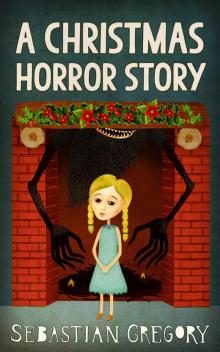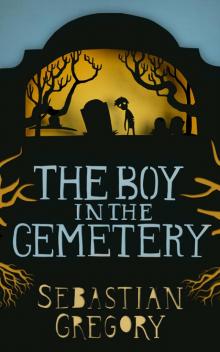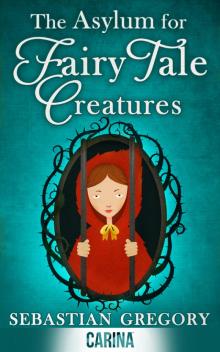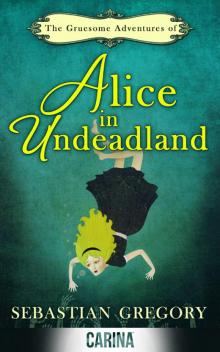- Home
- Sebastian Gregory
The Boy in the Cemetery Page 2
The Boy in the Cemetery Read online
Page 2
“It’s a funeral, Dad, just a funeral.”
“Not just a funeral,” snorted his father, “that’s an opportunity. See how well dressed they are. That’s velvet and silk not these stained wool suits we wear, boy. Whoever is in that coffin is going be wearing all kinds of fine jewels.”
“But the dead, Dad, won’t they mind?”
“The dead will welcome us, son. When they have been in the ground long enough and the flesh leaves them, they all smile, boy; the dead all smile.”
When the night arrived and the light bled from the world, the two made their way to the cemetery under a sky of purple and silver. Father brought tools, which he had hidden in a sack,buried under leaves in the outskirts of the woods. A rusted pickaxe and a dull yet effective spade. They arrived at the iron fence, gasping mist into the air. The boy wondered if his white breath was from fear rather than the evening cold. His heart was thumping so hard he feared his ribs would surely crack. Immediately his father knelt down and shovelled great clumps of dirt from under the railings.
“Keep a look out, boy,” his dad ordered.
The boy couldn’t take his eyes from the cemetery. He could see the gravestones peering from the dark like ships lost on a fog sea. Gas lamps shone tiny yellow lights in the otherwise cold, unforgiving black of the cemetery.
“Done,” said the father.
There was a space dug from under the fence, big enough for the two to crawl through.
“After you, boy.”
The boy hesitated, which made his father scowl. “Move it or would you prefer I throw you over?” Again the boy could not move. His imagination led him to believe there were dead things waiting for him in there. Rubbing their bony hands together and waiting to pull him into the soilwith them. It had been many years since his mother left the world. Yet his loss had left the boy with vivid, nightmarish senses that made him fretful of unknown, invisible things. His father did not have the burden of imagination and did not fear the dead.
He grabbed the boy by his neck and pushed him into the trench as if he weighed nothing. The boy had no choice to scramble through or be swallowed by the soil as sudden panic drove him through. He came to the other side spitting filth, trying not to swallow. His father crawled behind and pulled himself up, shaking himself cleaner, and smirked through gritted teeth standing by his choking boy.
“Suck it up, son; we have work to do,” he said, giving him a none-too-gentle kick with his boot, making the boy limp to his feet. And the boy felt, hatred and frustration knot in his stomach.
They walked to the sound of gravel crunching underfoot. Despite the dark, the moon lit the way and the cemetery was clear for anyone with eyes still in their sockets to see. Not that the shadows of the many oak trees were unkind to the trespassers as they went about their dark purpose,
From gravestone to gravestone and shadow to shadow, the father led the way like a hunting dog searching for a dead fowl bleeding in pond grass. Looking at each stone tableau, each stone cherub and words of loss until he found his prize. The soil was fresh and soft and the father tested it with the spade. It sliced the freshly turned grave easily.
“Ah yes,” he whispered in admiration of his find. “Here we are, all nice and snug. Be easy to dig this one out, boy. You look out for any wardens and I’ll find our prize. You should be proud, son; you’re about to learn a trade.”
The boy barely heard his father; he had been hypnotised by the statue that silently held vigil over the grave next to the one his father was violating. It was made of the purest marble and in the moonlight it sparkled. An angel in the garden of the dead. It held its hands together praying and its beautifully crafted wings wrapped around itself. It reminded the boy of his mother, floating away as if taken to Heaven. Except it was not Heaven calling her back, but the dark waters of the river pulling her deep below with her white nightgown billowing in the water like broken angel wings.
“Where is she looking?” the boy thought to himself.
And as he stared and wondered, a figure bore down upon him as if escaping from Hell itself. The man was upon him, his bearded face grimacing and snarling, his black clothes flowing from the shadow.
“Bloody thief,” it screamed.
The boy cowered unable to move but was spared when, from beyond the grave, his father collided with the grave warden and they fell to the ground violently. The boy managed to move and hid behind the angel. He closed his eyes tight and held his hands over his ears, trying to stop the groans and snapping sounds. Until finally the boy could only hear his own breath in and out, in and out, in and out and a hand took his shoulder. His surprise quickly turned to relief as his father stood over him.
“We need to go, son; leave the tools,” he said.
The boy went to reply butthe wound in his father’s stomach took his words. His father held his hand there but the wet red poured through his father’s fingers.
“ Bastard got me,” His father explained…
The journey back to the hovel by the docks was not an easy one. The boy’s father could only drag himself as his precious fluid poured. In the night of the city, the richer couples walking in the evening glanced at the father and boy and quickly avoided them. Whereas the two made their way home and closer to the slums, one or two less-desirables circled them like ravens ready to pick dead meat from bones. They saw the bloodstains left by the father, who was becoming more and more uncertain on his feet. However, he was a formidable size even wounded and anyone with sinister thoughts would attack him at their own peril. Then finally they made it home and as they entered through the broken and crumbling doorway, the father collapsed on the rag-sheet mattress.
“I’m done,” he mumbled, falling to fatigue. “I’m done, son.”
The boy kept vigil by his father’s side, unsure of himself if he did so from a misguided loyalty or to make sure the bastard died. The warm sun baked the darkness of the room, but this was nothing compared to the fever heat that came from the father as his blood soaked the rags and the untreated wound invited an infection. And infection came invited and unapposed, grasping the father with deep sweats and cold shivers of an almost rigor-mortis-like chill. The boy wet a rag from the leaking pipes and doused his father’s brow. He pulled back the makeshift bandages and inspected the deep slice in his father’s stomach. Maggots had found their way in and they writhed at the feast before them. The boy did not recoil at all; instead he stared almost with indifference to the sight, to the smell It was a mercy when his father died after days of seething in agony. The boy sat watching the still lump in the room. He shed no tears at his father’s death, for his mother had taken them all. Now the boy only felt a numbness. He stayed that way until the sounds of the world outside fell silent and the sun was replaced by the moon. Again and again the moon and sun came and went. The boy watched as his father’s skin turned green. A rat came from an unknown corner. That curious creature sniffed and nibbled at the dead man’s fingers. The boy made no attempt to stop it. Eventually hunger and thirst reminded the boy he was alive. The boy came to realise it was now the time to begin to look after his own well-being, before thirst or starvation claimed him. He was alone and therefore for survival’s sake, he would need to be able to provide for himself. The boy had seen children dragged kicking and screaming into the workhouse. Behind those high stone walls topped with razor wire and the serious black gates. Just as he had seen children pulled limp and silent from chimney stacks. He had heard stories of children working with the new weaving machines and losing limbs to their hungry spindles and threshing metals. His mother had always promised he would not go the same way. He would therefor take what his father had given. The only thing he had given him. He had taught him to steal the secrets of the dead.
He wandered a gas lit cobbled street and no one paid him any heed; it was as if he was no longer alive at all. And that moment the world seemed to melt away and he found himself in the cemetery watched by only the dead and the stars. Of course he stood in front of
the stone mother angel and he wondered if his mother looked down on him from Heaven or his father looked up from Hell. As the boy longed for the beautiful stone angel he began to be lost in her eyes. Not that they were any different from the first time he saw them, but now he saw something else in them. What were they seeing? he wondered. Those blank white marble orbs were staring at something behind him. Turning, the boy could only see the trees and the gravestones hiding in the dark. He wandered. A cool breeze shook the plant life, and uncovered what the angel knew to be there already. The mausoleum was an age older than any of the other tombs in the cemetery. The stone was once white but time had turned it moss grey. The entrance was an oak door that sagged under the weight of ivy that choked and grew over the stone pillars either side of the door.
The boy had to push branches to one side as he approached. It was as if the trees themselves were trying to deter him from his path. The boy could not be deterred and the scratching of the trees was nothing to the pain that fate had already inflicted upon him. He reached out, pulling the ivy from the door. The plant resisted but was torn aside nonetheless. The wind blew harder and the trees shook harder as the boy pushed at the creaking doors. They opened with no resistance. As the boy took his steps into the tomb the wind howled.. It sounded like a mother crying.
The tomb itself had an instant chill to it. There was moonlight seeping in from holes in the ceiling, giving the stone a grey misery. In the centre of the tomb, a stone coffin lay broken and open. It seemed that the boy was not the first to come looking for treasure. He was surprised at how fate had led him to the tomb only for his curiosity to be rewarded with disappointment. At the moment the boy turned to leave, the shadow flowed from the corner and gripped the boy, holding him in the air. The darkest of things holding the boy was at one time a man. That same-said time had ravaged the creature of its flesh. Clearly it was dead, yet it stood straight holding the boy; its eyes had long gone, but it stared at the boy through empty sockets. The sight before the boy was so far beyond the world he knew, that all fear was replaced with awe.
The dead man moved with the grace of dried twigs and leaves. It was barefooted and dressed in shredded rags. It was bald save for a few strands. When it spoke it sounded like urn ashes blowing on a storm.
“Boy? Why you here, boy?” it asked. The boy answered clear and true; he had no fear of this ragged beast. He had seen the death of a loved one and the death a hated parent. There were no horrors in the entire world or the next that could compare.
“I came for your secrets; the dead have no need of such things,” he said with defiance.
“Don’t we? Do I look dead to you, boy?”
“Yes, although this is not a true death. I have seen a true death.”
The dead creature laughed a rotten laugh, its breath a rancid stench. It slowly lowered the boy to his feet, before kneeling with a creak before him.
“Are you not scared, boy?” it asked.
The boy wondered if he should be and searched his inner soul for even a hint, curious he felt no fear at all.
“No, I feel nothing.”
“Why?” the dead man wanted to know.
“I have lost everything. There is nothing more that would cause me more upset.”
“How?” the creature wished to know.
“The Consumption took my mother’s mind and I watched as the river took her body. My father taught me how to search for the dead’s treasures. But I found only an undead thing. Like my father’s life, his teachings amounted to naught.”
The dead man pondered the reply. Its fleshless face wrinkled as if trying to understand. The dead man seemed to reach a decision. And it spoke. “Are you alone, boy?”
“Yes.”
“And you want my secrets, boy? Do you truly want my secrets and will you accept them as they are?”
“Yes,” the boy replied without hesitation.
“Then take them, boy; I have been this way for more years than there are worms in the ground. It is time to finally rest.”
And the dead man opened its mouth so wide its jaws snapped and from the maw came a green gas. It found the boy and entered his mouth and nostrils and eyes. The boy tried to cough but the gas found its way deeper into his lungs. And when the boy’s eyes stopped watering, the dead man had gone, replaced by rags decomposing on the tomb floor. The boy, to his dismay, realised no breath left his lips or heart pumped in his chest. He looked at his thin pale arms and the veins had turned black. For now they held the secrets of the dead. All that was left to do for the boy was to scream and scream and scream.
Chapter Three
The sky was a miserable overcast grey of obese clouds and depressed rain. Carrie Anne knew exactly how it felt. She sat in the back seat of the car, staring through a window that all the rain in the world seemed to be pelting. Her reflection, broken by the rain giving her face a melted look, stared back with bored and uninterested eyes. Her hair was long and blonde or so she always hoped it would be. Instead staring back at her was a sad face with lank hair that fell over her dark eyes and gaunt face. Her head rocked slightly as it lay on the headrest and in time with movement of the car, no, no, no, no, no, no, over and over again. She hardly recognised the reflection that looked back. She didn’t want to be that person; she didn’t want that life. She was twelve years old but felt a lot older in an unreal way as if time had aged her beyond any human means and now she was trapped in an emotional limbo, too young to understand herself as yet and too old to change. The rain tapped the car with the sound and force of a thousand pebbles; she felt the weather echoed her mood and Carrie Anne wondered if the sun even existed any more. Her father swearing at another driver broke her thoughts.
“David! There is no need for that.” Carrie Anne’s mother squealed in surprise at the string of expletives that had left her father’s mouth.
“Oh really, Lucy? Did you see that idiot? He nearly drove me off the road.” The rain was so thick that the constant swishes of the wiper blades were making it difficult to see the motorway roaring around them, never mind a driver intent on killing them. If they had been run from the road, Carrie Anne doubted she would even care.
She looked at her parents and inwardly felt a wave of sinking from her stomach. Her father sat driving, gripping on to the steering wheel and leaning hunched, as if he was trying to squeeze his face against the windscreen. His hair was dark and greasy and slicked back on his balding head. His hair looked like it was holding on for dear life before time took more of it. However, he did have a dark beard as fairly recently he had taken to not shaving, as this made up for his retreating hair line. Her father always had a permanent scowl. He was always angry with the world and any chance to vent was taken at every opportunity. For as long as Carrie Anne could remember her father had been disappointed. Sometime before she was born her father had an accident at his job as factory supervisor (what the factory made or what he supervised she didn’t know) but since then Carrie Anne knew two things about her father. The money settlement meant he would never have to work again and couldn’t thanks to his twisted spine that made him limp. And his life disappointed him and now he was never satisfied. He had been that way even before his accident that permanently took his ability to work. Carrie Anne suspected he was waiting for the favour the world owed him. Of course there was the other side to her father that she dared not dwell on, a secret side that although hidden was always in her thoughts and followed her as an overbearing shadow. No one knew of its existence except the three in the car.
All daddies do this, it means I love you, it’s OK mummy said it was OK, but it’s a game and we can never talk about it to anyone, you understand? Good girl, good girl.
Too late now, she had thought on it and her skin crawled and panic began to deepen her breath. The familiar feeling of being trapped and needing to suddenly run made her nerves prickle. She concentrated on her mother to distract herself. Her mother was extremely thin and her skin was mapped with deep blue veins. Carrie Anne’s m
other had a presence of denial about her. It was in her shuffle walk, her drooping shoulders and her dark ringed eye sockets. It soaked from her skull to her hair, which was a weave of long split ends. Despite her mother’s total inability to face reality, Carrie Anne loved her; she just wished she was different, stronger and able to think for herself rather than be told what reality was. She was too influenced by her husband, but Carrie Anne didn’t hate her for it. She knew that for her mother the truth must be too horrible to comprehend. Even when she caught him sneaking from her room. Had she always known?
Carrie Anne sat on her bed and pulled the covers around her ears to block out the sound of the shouting. There was screaming and accusations and crying. No one came to see if Carrie Anne was OK.
This is your fault; this is entirely your fault. You hurt your parents. This is your fault.
“Mum, say something.”
“How long has he done this?” The words came as easy as speaking with a mouth full of nettles. Carrie Anne could see the pain in her mother as she spoke.
“Just that one time you found him in my room,” she lied to spare her.
“Has he done anything else to you?”
“No, just…the touching.”
“Did you lead him on?” The words choked her.
“No, how could I? Why would I?” Her voice croaked through pain and upset and the knowledge that her mother couldn’t help her. She watched as her mother stood up and, like a blind woman, wandered out of the room to nowhere in particular.

 A Christmas Horror Story
A Christmas Horror Story The Boy in the Cemetery
The Boy in the Cemetery The Asylum for Fairy-Tale Creatures
The Asylum for Fairy-Tale Creatures The Gruesome Adventures of Alice in Undeadland
The Gruesome Adventures of Alice in Undeadland